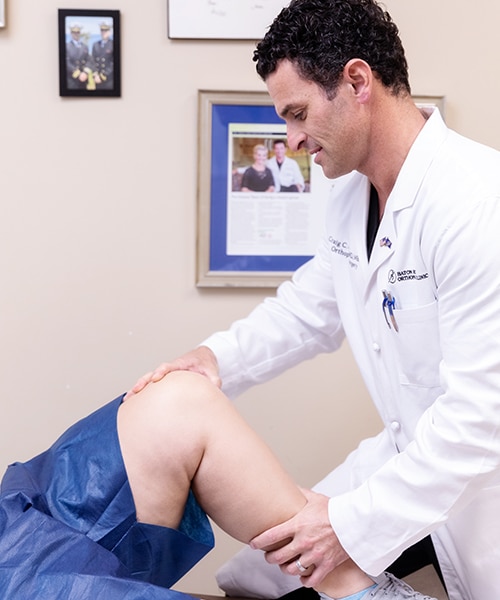When less invasive efforts do not provide the desired level of relief, total knee replacement may be the best option for restoring pain-free knee function. Based on the type and severity of damage present, as well as the symptoms experienced, Dr. Greene will determine whether knee replacement will enable successful patient recovery.
Causes for Replacing the Knee
Knee replacement is most often recommended when pain and loss of function inhibit the completion of everyday activities, such as walking, driving, or climbing stairs. Inflammation and discomfort are often unresponsive to intervention efforts, and become present both day and night, even when resting.
While a specific injury or infection may result in this condition, one of the most frequently reported causes is osteoarthritis. Although there may be genetic factors influencing the emergence of osteoarthritis, anyone may become susceptible through the course of general aging or use-associated wear-and-tear. Rheumatoid and traumatic arthritis are also associated with the need for total knee replacement.
Diagnosis and Preparing for Surgery
The severity and history of symptom progression will both be taken into account when determining the level of knee damage present. In addition, the orthopaedic team will take a record of overarching health and behavioral tendencies in order to identify any other factors or conditions that may influence ultimate treatment success.
A battery of motion, strength, and alignment tests will be completed to assess basic knee stability and flexibility. To determine the condition of the knee’s bones and soft tissues, other diagnostic efforts may include, but not be limited to an x-ray, MRI, bone scan, and/or blood tests. If the assessment results in the recommendation of total knee replacement, Dr. Greene and his team will provide recommendations for pre-op preparation, as well as expectations for post-op recovery.
Prior to a total knee replacement, it may be necessary to make modifications to the home or work environments, such as the installation of safety rails or creation of a single-floor living environment. In addition, adjustments to medication use or other behaviors may be needed in the weeks prior to surgery.
Approaches to Knee Replacement
Due to the complexity of knee replacement, operations are typically completed on an in-patient basis, providing for appropriate post-op monitoring and recovery time. In most cases, general anesthesia will be used, allowing the patient to sleep throughout the course of the surgical procedure.
During a total knee replacement, the damaged bone and cartilage will be removed and replaced with a prosthesis. This substitute joint will be held in place with bone cement, enabling greater security both during the healing process and over the long-term.
Whenever possible, a total knee replacement will be completed on a minimally invasive basis. If undertaken, this approach will employ arthroscopic techniques and smaller incisions (in comparison to a traditional open surgery). Dr. Greene is also able to offer a tourniquet-less knee replacement procedure. A tourniquet-less procedure offers many benefits for the patient, including less blood loss, less post-operative pain, and easier rehabilitation.
Dr. Greene will determine the best surgery option for total knee replacement based upon the level of damage present, as well as factors such as overarching patient health, age, bone structure, and weight.
Post-Op Care and Considerations
Following a total knee replacement, the patient will likely be required to stay in the hospital for at least 2-3 days. Upon release, it will be important to avoid use of the joint until the orthopaedic care team advises that it is safe to resume specific activities. In most cases, once basic activities can be undertaken, a walker or other support will be used for at least one month to avoid placing undue pressure and weight on the treated knee.
Other recovery efforts will include, but may not be limited to:
- Use of pain and anti-inflammatory medications
- Bracing
- Completion of regular physical therapy and at-home exercises
While the risks associated with knee replacement are limited, any complications should be the focus of immediate medical care. Report any unusual pain, discomfort, or other symptoms to Dr. Greene’s team immediately.
To learn more about the approaches to knee replacement offered by Dr. Craig C. Greene and the Baton Rouge Orthopaedic Clinic, contact the Baton Rouge, LA office at (225) 800-4640.

Specialties
- Anterior Hip Replacement
- Knee Replacement
- Sports Medicine
- Orthopaedic Surgery FAQ
- Arthritis
